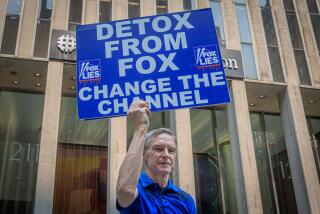Don’t Hide the News From Hidden Cameras
- Share via
There can hardly be anything left to say about hidden cameras or how ABC News used them inside the food preparation rooms of Food Lion supermarkets to show, it said, stale and spoiled food being rewrapped for sale, and other nasty things.
ABC is of course appealing the $5- million fine at North Carolina jury levied because network employees, the ones who worked the secret cameras, had used false job applications to get hired by Food Lion. Some of the noblest voices in journalism have dived into print decrying this low-rent way of getting a story, fussing that it demeans the journalistic process, and now wonder people hate the media.
Which leaves nothing left to say except perhaps, this:
“News is what someone somewhere wants to suppress. Everything else is advertising.” One of the earliest British press tycoons formulated that useful definition. How many news stories in your favorite newspaper or newscast were obviously done with the help and for the benefit of the people in those stories, and how many are about what somebody wants to keep quiet?
Selling the public moldy meat is something that whoever is doing it wants to suppress. It also is something you want your newspaper or newscast to tell you. The report should be accurate, of course. But accuracy was not an issue in this case. This was not a libel case. It was about reporters using subterfuge to get into Food Lion’s back rooms. After the trial, a juror said, “If you’re going to do it, do it legally.” Another said, “You can’t misrepresent yourself to get the news.”
Food Lion officials who claim that the ABC News report cost the company billions of dollars in lost revenue and lower stock value, gave out some argle-bargle that they would have claimed libel if it had been technically possible. But even if that’s so, the truth of what ABC News said never came out before the court. In short, economically damaging reporting is punishable even if it is not proved false. Or even misleading.
The constitutional implications of this would seem to be terrifying. But it is not what frightens those panjandrums of the Fourth Estate who decry hidden cameras or undercover reporting as beneath the dignity of their high calling. “News organizations should not be untruthful in their search for the truth,” one said primly, sounding more like a pooh-bah than a reporter who had to pry news out of reluctant sources.
The complaints about ABC’s hidden cameras seem to embody two submerged themes, what are widely called “subtexts” these days. One is that in the news hierarchy, people who talk about the news rather than go out and get, or those who write about big, historic issues, are at the top, and those who look for detailed news, like police reporters with dirty fingernails who report on stickups and fender-benders, are at the bottom. And it is indeed true that police reporters do not interest lecture agents.
The other subtext is that television is less “legitimate” than other news media, and that this latest embarrassment to all journalism is once again television’s fault. If it had not been for television’s “need for pictures,” the critics say over and over, none of this would have happened. Here, too, there is a grain of truth. Radio news, for example, does not use hidden cameras. Trying to be constructive, one of America’s most eminent journalists suggested that instead of the effort of getting pictures of moldy meat, he would have found a disgruntled former employee to say to the camera, “Boy, was that meat moldy!”
Such criticisms come mostly from people who have done so well in print journalism that they get to sit on TV panels. They like to use words like “reportage” and “agenda.” Their idea of a good TV news picture is one of them talking.
Like all the other older professions, news may be destroying itself by putting on such airs. The trusted Walter Cronkite writes of voting under false names, twice in the same election, back in his Kansas City days. (The report was never used because his employer was a friend of the political boss who paid people to vote under false names, but that’s another story.) If you think there is a difference between “news” and “information retrieval,” you do things like that. And never mind the Pecksniff who wrote, “Stunt journalism saps the credibility of the press.” As the kids say, get a life!
ABC News was fined, when all is said and done, for false statements on job applications. If every American who made a false statement on a job application were fined $5 million, there would be no national debt.
More to Read
Sign up for Essential California
The most important California stories and recommendations in your inbox every morning.
You may occasionally receive promotional content from the Los Angeles Times.













